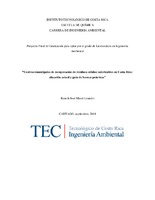Centros municipales de recuperación de residuos sólidos valorizables en Costa Rica: situación actual y guía de buenas prácticas
Resumen
The promotion of Material Recovery Facilities (MRF) is part of the country strategy to
increase the percentage of recovered waste. However, there is a knowledge gap on the
management and production processes of the MRF at the national level, which affects the
good performance of the facilities. This document explores the technical and environmental
factors related to the infrastructure, equipment and work procedures of municipally owned
MRF in the country and proposes good practices for its design and operation. Information of
15 municipal MRF was obtained via a survey, of which 5 were visited in order to corroborate
and expand the information collected. In 80% of the facilities, less than 41 ton / month of
waste are processed and in 93% of them the separation operation is carried out manually on
a static surface, this separation method is suitable for the quantity of waste processed in 87%
of cases. The location, topography and accessibility of the lands are generally adequate and
do not negatively affect the performance of the facilities. In most cases, the infrastructure
was not designed to function as a MRF, so its characteristics are not oriented to maximum
efficiency in the operation. The absence of records and written work procedures is a constant
in the facilities studied. In most cases, inadequate ergonomic conditions were identified in
the classification stations, absence of methods to evaluate the performance of the operators
and deficiencies in the personnel training process. The good practices proposed to influence
the identified factors were validated in a workshop with representatives of the sector.
Descripción
Proyecto de Graduación (Licenciatura en Ingeniería Ambiental) Instituto Tecnológico de Costa Rica, Escuela de Ingeniería Ambiental, 2018.


